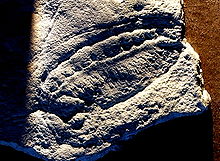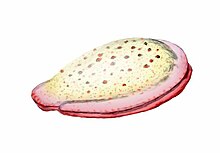Kimberella
| Kimberella | |
|---|---|

| |
| Remarkably preserved Kimberella at Arkhangelsk Regional Museum, Russia. | |

| |
| Cast of a partial Kimberella fossil. | |
| Scientific classification | |
| Domain: | Eukaryota |
| Kingdom: | Animalia |
| Clade: | Bilateria |
| Genus: | †Kimberella Wade, 1972[1]
|
| Type species | |
| †Kimberella quadrata Glaessner & Wade, 1966
| |
| Species | |
| |
| Synonyms | |
| |
Kimberella is an extinct
Specimens were first found in Australia's
The classification of Kimberella is important for the scientific understanding of the Cambrian explosion; if it was a mollusc, or at least a protostome, this would mean that the two dominant Nephrozoan lineages would have diverged significantly before 555 million years ago, and if it was at least bilaterian, its age would indicate that animals were diversifying well before the start of the Cambrian.[4]
Etymology

The genus is named in honour of Mr. John Kimber, student, teacher, and collector; who lost his life during an expedition to Central Australia in 1964. Originally, the genus was given the name Kimberia,
Occurrence
Kimberella has been found in the
Description
Over 1,000 specimens, representing organisms of all stages of maturity, have now been found in the White Sea area at the bottom of fine-grained sandstone layers.[2][11] The large number of specimens, the small grain-size of the sediments and the variety of circumstances in which specimens were preserved provide detailed information about Kimberella's external form, internal anatomy, locomotion and feeding style.[2]


All of the fossils are oval in outline. Elongated specimens illustrate that the organism was capable of stretching in an anterior-posterior direction,
Kimberella had a dorsal covering that has been described as a (non-mineralized) "soft shell"; in larger specimens, this reached up to 15 cm in length, 5–7 cm in width, and 3–4 cm in height;[12] with a minimum length of 2–3 mm.[2]
The shell was stiff but flexible, and appears to not have been mineralized, becoming tougher as it grew larger (and presumably thicker) in more mature specimens.[2] The deformation observed in elongated and folded specimens illustrates that the shell was highly malleable; perhaps, rather than a single integument, it consisted of an aggregation of mineralised sclerites.[11] At the highest point was a hood-like structure, forming what is thought to be the front.[9][12] In some specimens, the inner surface of the shell bears stripes spanning the width of the creature; these may represent points of muscle attachment.[2] Similar stripes around the edge of the shell may have been connected to muscles that retracted the foot into the shell.[2]
The long axis of the organism is marked by a raised ridge; the middle axis is slightly humped. Kimberella's body had no visible segmentation but had a series of repeated "modules". Each module included a well-developed band of dorso-ventral muscles running from the top to the single, broad, muscular "foot", and smaller, transverse ventral muscles laterally across the underside of the body. The combination of these dorso-ventral and transverse ventral muscle bands enabled Kimberella to move by rippling its foot.[9][12]
The body also had a frilled fringe that may have been part of the animal's respiratory system, performing a function similar to that of
Ecology
Kimberella dwelt in shallow waters (up to tens of meters in depth), sharing the calm, well-oxygenated sea floor with
Kimberella probably grazed on microbial mats, but a selective predatory habit cannot be ruled out.[2] Fossilized gut content seems to confirm it was grazing on bentic bacteria and algae, the latter having gone through their own ecological "big bang" 650 million years ago in the marine ecosystem, providing a more nutrient rich diet for early animals.[13][14] Fedonkin reckons that as it ate, it moved "backwards"; the trail thus created was destroyed by the subsequent grazing activity.[2] Conversely, Gehling et al. claim that it moved 'forwards'.[15] Fans of grooves are often found radiating from the "head" end of the organism; these indicate that the organism stayed in one place, and raked the surface of the microbial mat towards it by extension of its head, which bore two "teeth".[11] Gehling et al. reconstruct Kimberella as having a long neck that operated like the arm of a digger, rotating about an axis perpendicular to the sea floor in order to produce the sweep of the fan, and rotating towards and away from the animal to scrape food from the substrate to the mouth. In one community Kimberella has been shown to be avoiding its grazing traces, demonstrating complex sensory behaviour.[16]
The lack of evidence of asexual reproduction suggests that the organisms reproduced sexually. Budding or fission has never been observed.[2]
The waters in which Kimberella dwelt were occasionally disturbed by sandy currents, caused when sediments were whipped up by storms or meltwater discharge, and washed over the creatures. In response to this stress, the organisms appear to have retracted their soft parts into their shells; apparently they could not move fast enough to outrun the currents.[2] Some organisms survived the current, and attempted to burrow out of the sand that had been deposited above them; some unsuccessful attempts can be seen where juveniles were fossilised at the end of a burrow a few centimetres long.[2]
Preservation

Kimberella fossils are generally preserved on top of clay-rich beds and beneath sandy beds.[11] All fossils are preserved as depressions in the bases of beds, implying that the organism, although not mineralised, was firm enough to resist being crushed as sediment accumulated above it; as the soft parts of the organism decayed, the soft muds underneath would be squeezed up into the shell, preserving the shape of the organism.[2]
Preservation of most specimens was made possible by the fast sedimentation that quickly cut the organism off from seawater; it may also have been enhanced by the decay products of the rotting organism, which could have helped the overlying sediment to mineralise and harden.[2] It has been suggested that a mucus trail produced by the organism may have assisted its preservation,[2] but experiments suggest that mucus disintegrates too easily to play a role in binding sediment together.[17]
Classification

All the Kimberella fossils found so far are assigned to one
So far, Kimberella fossils show no sign of a
Taken together, sceptics doubt that the available evidence is enough to reliably identify Kimberella as a mollusc or near-mollusc, and suggest that it is presumptuous to call it anything more than a "possible" mollusc,[8] or even just a "probable bilaterian".[4]
Theoretical importance
| Part of a series on |
| The Cambrian explosion |
|---|
 |
The Cambrian explosion is an apparently rapid increase in the variety of basic body structures of animals in the Early Cambrian period, starting after 543 million years ago and finishing before 518 million years ago.[24] A few of the Early Cambrian fossils were already known in the mid-19th century, and Charles Darwin saw the apparently sudden appearance and diversification of animals as one of the main objections that could be made against his theory of evolution by natural selection.[25]
The majority of animals more complex than
See also
References
- ^ a b c d Wade, M. (1972). "Hydrozoa and Scyphozoa and other medusoids from the Precambrian Ediacara fauna, South Australia" (PDF). Palaeontology. 15: 197–225. Archived from the original (PDF) on 2011-04-09.
- ^ OCLC 156823511
- ISBN 9780128143124.
- ^ S2CID 29130876.
- ^ a b Glaessner, M.F.; Wade, M. (1966). "The late Precambrian fossils from Ediacara, South Australia" (Free full text). Palaeontology. 9 (4): 599.
- ^ Glaessner, M.; Daily, B. (1959). "The Geology and Late Precambrian Fauna of the Ediacara Fossil Reserve" (PDF). Records of the South Australian Museum. 13: 369–401. Retrieved 2008-07-16.
- PMID 29567986.
- ^ S2CID 1019572.
- ^ S2CID 4395089.
- ISBN 0-306-44067-9.
- ^ S2CID 85676210.
- ^ S2CID 331187. Archived from the original(PDF) on 2008-07-21. Retrieved 2008-07-10.
- ^ World's oldest meal helps unravel mystery of our earliest animal ancestors
- ^ "The algae that terraformed Earth". BBC News. Archived from the original on 2023-07-13.
- S2CID 140559034.
- PMID 32642052.
- ^ Getty, P.R. (2006). "Producing And Preserving Climactichnites". Geological Society of America Abstracts with Programs. 38 (7): 475. Archived from the original on 2012-02-11. Retrieved 2008-06-02.
- S2CID 128638405.
- ^ PMID 12070079.
- S2CID 86523806.
- ^ S2CID 128638405.
- PMID 22915671.
- S2CID 86083492.
- ISBN 0-632-04444-6.
- ^ Darwin, C (1859). On the Origin of Species by Natural Selection. Murray, London, United Kingdom. pp. 315–316.
